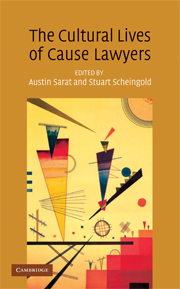Book contents
- Frontmatter
- Contents
- Acknowledgments
- Contributors
- Bringing Cultural Analysis to the Study of Cause Lawyers: An Introduction
- PART I THE CULTURAL WORK OF CAUSE LAWYERS
- PART II THE CULTURAL CONSTRUCTION OF LAWYERS AND THEIR CAUSES
- 4 “They all have different policies, so of course they have to give different news”: Images of Human Rights Lawyers in the British Press
- 5 Ed Fagan and the Ethics of Causes: Who Stole Identity Politics?
- 6 Of Windmills and Wetlands: The Press and the Romance of Property Rights
- 7 “The Kids are Alright”: Cause Lawyering on Television in 1960s America
- 8 Nothing to Believe In – Lawyers in Contemporary Films About Public Interest Litigation
- 9 “Of course he just stood there; he's the law”: Two Depictions of Cause Lawyers in Post-Authoritarian Chile
- 10 Paulina Escobar as Cause Lawyer: “Litigating” Human Rights in the Shadows of Death and the Maiden
- PART III THE CULTURAL RECEPTION OF LAWYERS AND THEIR CAUSES
- Index
8 - Nothing to Believe In – Lawyers in Contemporary Films About Public Interest Litigation
Published online by Cambridge University Press: 08 January 2010
- Frontmatter
- Contents
- Acknowledgments
- Contributors
- Bringing Cultural Analysis to the Study of Cause Lawyers: An Introduction
- PART I THE CULTURAL WORK OF CAUSE LAWYERS
- PART II THE CULTURAL CONSTRUCTION OF LAWYERS AND THEIR CAUSES
- 4 “They all have different policies, so of course they have to give different news”: Images of Human Rights Lawyers in the British Press
- 5 Ed Fagan and the Ethics of Causes: Who Stole Identity Politics?
- 6 Of Windmills and Wetlands: The Press and the Romance of Property Rights
- 7 “The Kids are Alright”: Cause Lawyering on Television in 1960s America
- 8 Nothing to Believe In – Lawyers in Contemporary Films About Public Interest Litigation
- 9 “Of course he just stood there; he's the law”: Two Depictions of Cause Lawyers in Post-Authoritarian Chile
- 10 Paulina Escobar as Cause Lawyer: “Litigating” Human Rights in the Shadows of Death and the Maiden
- PART III THE CULTURAL RECEPTION OF LAWYERS AND THEIR CAUSES
- Index
Summary
Introduction
“Ya know why everyone thinks that all lawyers are back-stabbing, blood sucking scum bags? Because they are.”
(Julia Roberts, Erin Brockovich)“If somebody like her came to see me back in New York with this dogshit case … you know what I'd do? I'd take it. Settle quick, pocket the contingency … make more money than her, never see a courtroom.”
(Woody Harrelson, North Country)A cavalcade of American films over the last fifteen years has addressed legal challenges by lawyers representing ordinary citizens who have been harmed by products or practices of large private corporations. The types of legal actions featured in these films are very much like one familiar form of public interest litigation that we ordinarily associate with cause lawyering. According to some critical observers, these films reflect a strong liberal and pro-lawyer bias. These films, we are told, portray modern mass corporations and other large entities as lawless symbionts driven by the amoral and immoral pursuit of profits and awash in reckless and unaccountable perfidies. At the same time, these films purportedly portray the “trial lawyer as (the) hero” who most successfully challenges the corporation, its unlawful practices, or its owners. In this common reading, contemporary films offer simplistic narratives celebrating left-wing cause lawyering on behalf of victimized American consumers and workers.
Such “good press” for cause lawyers would, if plausible, be a novel development in U.S. cultural history.
- Type
- Chapter
- Information
- The Cultural Lives of Cause Lawyers , pp. 230 - 252Publisher: Cambridge University PressPrint publication year: 2008
- 1
- Cited by



